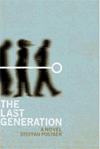Be Devastating Young Lady.
January 28, 2021

“I’m going to tell you a true story, okay?”
Callie is looking at her phone but you know she is listening. You are driving her to rehearsal. She has a big part in Les Miserables. She plays the grown-up version of Cosette. Though you saw the movie you don’t really remember the story. Victor Hugo is not your thing. Being a musical, Callie has been practicing her song for weeks. You’ve heard her belting out lyrics from her room, in the shower, on the trampoline in the backyard, which she pretended was a stage. You couldn’t tell if she was good or not but her enthusiasm was infectious. It gladdened you to see her so passionate, so happy. Many members from your family are coming in to see her perform. Hundreds of other people as well. The tickets cost money and this is a real show. Up until yesterday Callie had been totally psyched.
One of her “friends” had disrespected her online, insulting her singing skills or some other shit. Usually a brick, Callie had been wounded. Your wife told you as much. Now you felt it in your daughter’s sullen demeanor.
So you tell her a story…
“Before you were born,” you begin. “Back when I was coming up at my agency in Chicago, we were preparing for this huge presentation. It was my idea we’d be showing. I had written all the copy. And I had the game to go with it. I knew what I was going to say and how I was going to say it. I had my shit down.”
Callie looks up when you curse. Good. You had her attention. No easy feat with a teenager.
“Anyway, the night before I rehearsed my bit in front of the team. I get done. My colleagues are pleased. One even clapped. Then the head account person –the guy who deals with the client- he proceeds to crap all over my work. He’s not happy with the creative, he says. It’s shit. I’m dumbfounded. Where did this come from? He’d seen it before.”
Traffic on the 101 is heavy but it allows you to turn and look at your daughter. “The guy says to me, in front of everybody, if you present that work tomorrow it will be Armageddon.”
“The end of the world?” Callie asks. “What did you do?” Callie’s eyes are one of her most beautiful features, big and blue, and they are wide open staring at you.
You laugh. “I told him I would make changes. That I’d do what he wanted.”
“That sucks,” your daughter says.
“It would have sucked,” you say. “Had I listened to him. The next day I delivered my presentation just as I’d planned it. My work. My way. And I fucking killed it. When I was done the client cheered.”
“Really?”
“Damn straight,” you say. “But the story’s not over. After the meeting ends, everybody’s shaking hands, patting each other on the back. I walk over to the account guy who’d dissed my work. He thinks I’m going to shake his hand. I look him right in the eyes, and I say, ‘Welcome to Armageddon, asshole.’”
Almost missing your exit, you swiftly change lanes. So caught up are you in the tale.
“Wow, that’s a great story, dad,” Callie says. “It’s all true?”
“Every bit, sweetheart.”
At the red light, you look at Callie full on. The middle child, she’s the sassy one. The daughter that gives your wife the most trouble. You choose your words carefully. “If people disrespect you or your work that does not mean you have to listen to them. Just be…”
The light turns green and you move the car forward. The word comes to you.
“Devastating.”
AA teaches that redemption comes from being of service. Letting go the bondage of self. This is true. Yet redemption also comes by shattering the chains from the bondage of others. You want your daughter to believe in herself, even when others don’t.
In the parking lot, Callie thanks you for driving her to practice. But you sense something deeper. You can see it in her eyes.
The fierceness has returned.
You watch Callie as she marches toward the theater, joining her other cast members. When she was a toddler, she had refused to walk upright, instead choosing to tread on her knees. The pediatrician had concerns. Your wife was worried. It’s not normal, they said. But you knew her day would come. And in your mind so did she.

Most of the television shows and movies I watch contain a preponderance of alcohol, tobacco or drugs. Many of them are integral to the plot itself. Platforms like Netflix and Hulu (among many, many others), free and clear of network restrictions, opened Pandora’s Box in terms of sexual and violent content. To say nothing of the Internet.
Some of the most popular and/or critically acclaimed shows on any screen are predominantly about illicit drug use, alcoholism and related topics: Breaking Bad (Methamphetamine), Shameless (ETOH) and Euphoria (<ATOD) One needn’t be a pearl-clutcher to say it’s difficult finding mass-appeal content that doesn’t feature ATOD’s.
But I tried.
“PEN 15” is a serial on Hulu about two awkward adolescent girls navigating the perils of middle school. The conceit is that the two leads are actually adult women playing themselves from that time period. It’s actually pretty good.
In the episode I watched the two girls find them selves hiding in the girl’s bathroom at school to avoid bullies (a constant threat for them), when they find a cigarette on the floor. This lone cigarette proves to be a catalyst for all manner of awkward, ridiculous and potentially scandalous ADULT behavior.
Later, the girls are playing with dolls together when their entire childhood gets called into question. Old behaviors suddenly seem boring to them –childish.
They toss the dolls onto the floor and reach for the cigarette.
But in order to smoke it they will need a lighter. So the girls decide to dress up to look older and this becomes a whole scene onto itself. Using makeup they took from their parents and the “flyest” clothes they can muster, the “ladies” glam up in order to venture to the corner store in their neighborhood. They believe looking older is necessary in order to purchase a Bic lighter. There, one mocks a child who is line with his mother for being “with his mommy.” The two adolescents ape all manner of supposed older behavior –costume, makeup, attitude- all because of the still un-smoked cigarette they found in girl’s bathroom at school.
As it has been for countless adolescents, the cigarette symbolizes adulthood. PEN 15 (a combination of characters intended to mimic “penis”) is a coming of age comedy and the cigarette portends all that await these two awkward kids on the cusp of being teenagers.
The show then introduces another concept familiar to every kid who ever got the talk about ATOD: that smoking cigarettes is a gateway to even more scandalous behavior. The girls show up at the hangout of a group of 8th grade girls and ask if they can join them “to smoke.” The older girls invite them in. After a lot of posturing (in order to impress the older kids) one ends up chugging a beer. The other tries a whippet (inhalant) and passes out.
Not only has the still-unsmoked cigarette lead to alcohol and inhalants it has also presented the viewer with a classic case of peer pressure and its effect on young people regarding drinking and using drugs.
Then the boys show up. In a painfully awkward scene each boy chooses a girl ostensibly to pair off and make out: the ultimate taboo! The two girls reluctantly pair up with two boys and, while they don’t “hook up” per se, the promise of illicit sex hangs in the air. We see brief scenes of the 8th graders canoodling in the dark.
A parent shows up and “busts” the party before anything else occurs. The two hero girls end up taking the fall for the beer and bad behavior. A be careful what you wish for moment for the two aspiring teenagers. Here, getting busted is also an iconic plot point in the age-old tale of experimenting with drugs. In shows like Breaking Bad and Shameless people get arrested or even killed for getting caught, Of course, in this story nothing like that remotely happens. The two are sent home to their mothers.
Handled briefly here, a poignant scene featuring one of the girl’s mothers frowning sadly at her daughter. She does nothing but walk away. Yet, her silence speaks volumes, more punishing to her child than a scolding. A parent’s disappointment is yet another trope in such stories (and in reality). The sad, helpless mother is an indelible part of the ATOD narrative.
The final scene of the episode has the two girls back in their playroom… pondering the unlit cigarette that started it all. They decide to put it away in a jewel box, saving it for another day. They resume playing with their dolls. Roll credits.
To be sure, the ending is sweet. Yet, it’s interesting to note that they do not dispose of the cigarette but rather hold onto it. The butt caused them nothing but trouble yet the trouble was a shared memory of an adventure that bonded the two girls. Romanticism is an inextricable part of ATOD’s. Always was and maybe always will be.
Welcome to Armageddon
September 25, 2020

“I’m going to tell you a true story, okay?”
Callie is looking at her phone but you know she is listening. You are driving her to rehearsal. She has a big part in Les Miserables. She plays the grown-up version of Cosette. Though you saw the movie you don’t really remember the story. Victor Hugo is not your thing. Being a musical, Callie has been practicing her song for weeks. You’ve heard her belting out lyrics from her room, in the shower, on the trampoline in the backyard, which she pretended was a stage. You couldn’t tell if she was good or not but her enthusiasm was infectious. It gladdened you to see her so passionate, so happy. Many members from your family are coming in to see her perform. Hundreds of other people as well. The tickets cost money and this is a real show. Up until yesterday Callie had been totally psyched.
One of her “friends” had disrespected her online, insulting her singing skills or some other shit. Usually a brick, Callie had been wounded. Your wife told you as much. Now you felt it in your daughter’s sullen demeanor.
So you tell her a story…
“Before you were born,” you begin. “Back when I was coming up at my agency in Chicago, we were preparing for this huge presentation. It was my idea we’d be showing. I had written all the copy. And I had the game to go with it. I knew what I was going to say and how I was going to say it. I had my shit down.”
Callie looks up when you curse. Good. You had her attention. No easy feat with a teenager.
“Anyway, the night before I rehearsed my bit in front of the team. I get done. My colleagues are pleased. One even clapped. Then the head account person –the guy who deals with the client- he proceeds to crap all over my work. He’s not happy with the creative, he says. It’s shit. I’m dumbfounded. Where did this come from? He’d seen it before.”
Traffic on the 101 is heavy but it allows you to turn and look at your daughter. “The guy says to me, in front of everybody, if you present that work tomorrow it will be Armageddon.”
“The end of the world?” Callie asks. “What did you do?” Callie’s eyes are one of her most beautiful features, big and blue, and they are wide open staring at you.
You laugh. “I told him I would make changes. That I’d do what he wanted.”
“That sucks,” your daughter says.
“It would have sucked,” you say. “Had I listened to him. The next day I delivered my presentation just as I’d planned it. My work. My way. And I fucking killed it. When I was done the client cheered.”
“Really?”
“Damn straight,” you say. “But the story’s not over. After the meeting ends, everybody’s shaking hands, patting each other on the back. I walk over to the account guy who’d dissed my work. He thinks I’m going to shake his hand. I look him right in the eyes, and I say, ‘Welcome to Armageddon, asshole.’”
Almost missing your exit, you swiftly change lanes. So caught up are you in the tale.
“Wow, that’s a great story, dad,” Callie says. “It’s all true?”
“Every bit, sweetheart.”
At the red light, you look at Callie full on. The middle child, she’s the sassy one. The daughter that gives your wife the most trouble. You choose your words carefully. “If people disrespect you or your work that does not mean you have to listen to them. Just be…”
The light turns green and you move the car forward. The word comes to you.
“Devastating.”
AA teaches that redemption comes from being of service. Letting go the bondage of self. This is true. Yet redemption also comes by shattering the chains from the bondage of others. You want your daughter to believe in herself, even when others don’t.
In the parking lot, Callie thanks you for driving her to practice. But you sense something deeper. You can see it in her eyes.
The fierceness has returned.
You watch Callie as she marches toward the theater, joining her other cast members. When she was a toddler, she had refused to walk upright, instead choosing to tread on her knees. The pediatrician had concerns. Your wife was worried. It’s not normal, they said. But you knew her day would come. And in your mind so did she.
The world is a stage and you just gave an important player some badass direction.
Daughters of Bliss stare into the Abyss
August 28, 2020

You don’t envy your daughters or any young person. Their world seems vapid and idiotic – an endless slew of You Tubes and disappearing dick pics. You must explain almost every reference to the 20th century. They do not read for pleasure and barely for school. If it isn’t on their social media feeds they aren’t consuming it. Yet, you do envy their paradoxically thick skins. Their ability to “shake it off” was remarkable.
Moving through life’s minefield with ease you find breathtaking. Does a glib term like triggered render brutalities benign? For all the very real talk of bullying and its fatal consequences, maladjusted loners shooting up high schools, your children seem blissfully immune. If they are on the receiving or giving end of any such terrors you are unaware of it. Are they living sheltered lives? Undoubtedly. Will the real world punch them in their pretty faces soon enough? Probably. But that they are oblivious or even impervious is one hundred percent a fucking miracle.
Play Misty for Me
July 27, 2020

Everyone experiences situational depression. Conflict. Unresolved resentments. Sometimes it really is just the humidity. Having a bad day. You either accept the situation or change it. Regardless, it always ends. It is not clinical. Professional help and medicine are seldom required. What you are experiencing is neither clinical nor situational. Sadness descends upon you like mist. By no means pleasant it isn’t debilitating either. You can see through it. You can operate heavy machinery. You probably won’t drink over it.
Many people insist on finding a culprit for their misery: someone or something to blame. The world is filled with people making this mistake. One feels like shit because of a spouse, a boss, a relative, a neighbor, the President of the United States. You know better than to assign blame for melancholy. Yes. You’d like to make the blues situational. Then you could rectify the situation or be its victim. For years, you were the blindfolded child swinging madly for a target. Creating situations to meet your depression was understandable… and also idiotic.
You now have healthy ways to mitigate woe. AA taught. Others you picked up all by yourself. Be of service. Go for a run. Pray. Basically, do anything but wallow in it. You cannot think your way out of depression. If anything, thinking caused it. In the wild, animals do not get depressed because they do not sit around thinking. Food and shelter is their constant priority, their only priority. Put a bear in a zoo and it becomes depressed, anxiously pacing back and forth, sullen and surly. Domesticated, it turns neurotic.
Your mother was (and maybe still) clinically depressed. She has spent her whole life (and so yours) dealing with this problem. You read somewhere that far more women are clinically depressed than men. Maybe that’s because historically women have been domesticated more than men, anxiously pacing back and forth in their kitchens, sullen and surly in equal measures.
To be Continued.



 The Happy Soul Industry
The Happy Soul Industry The Last Generation
The Last Generation